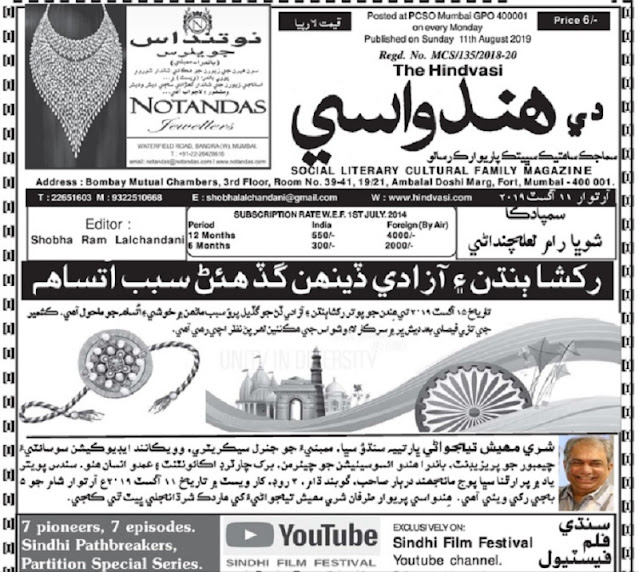Message of Latif According to G.M.Syed
A lot has been said and written about G.M. Syed, a multi-dimensional personality, was a social worker, scholar, mystic and a political figure all at same time. Syed an important face of Muslim League in 1940s, later became the founding father of modern nationalism and gave the concept of Sindh being an ancient country and Sindhis being a separate and well-civilized nation from pre-historic days.
Believing in the ideology of mysticism Syed faced problems from an early age, as his father was killed; being the only male child in the family young Syed was raised at his hometown Sann, some 68 kilometers away from Hyderabad. He received his early education up to sixth standard at home learning Sindhi, English, Persian, Arabic, and later on Urdu. As a book lover he maintained a personal library.
In his biographical notes Syed writes:
‘From an early age God gave me a heart opened for knowledge and reasoning. Due to this I was engaged in thinking about various aspects, while reading I used to go into deep thinking and the book used be on my chest, after sometime I would realize my concentration wasn’t in it.’
Syed had a daily practice of reading a book from 8:00 to 12:00; he was interested in subjects like comparative religions, history, mysticism, philosophy and politics. Another positive aspect of Syed’s life was he maintained a daily dairy from 1920. According to Dr. Allah Rakhio Butt Syed had 4705 books at his personal library, having most number of English books, which were numbered 2237, then Sindhi books numbering 1670, Urdu books 495, while Persian 204 books, apart from that 40 ancient manuscripts.
The year 1967 brought a revolutionary change in Syed’s life as he was house arrested, which he himself mentions in preface to his booklet ‘Sindh Ja Surma’ (Heroes of Sindh):
‘On July 7, 1967, the government once again announced house arrest orders against me, so I got a chance to sit at one place and opened new dimensions for me.’
From his bitter experiences Syed learned that no change would come by political commentary. So he decided to work on Sindhi culture and its history. To promote and propagate Sindh’s true identity he formed a study circle ‘Bazm-e-Sufiya-e-Sindh’. One of the important features of this circle was to highlight life and works of Sindhi heroes. To achieve this purpose Syed initiated to write biographical notes on five heroes of Sindh, including: Raja Dahir, Dodo Soomro, Dulha Darya Khan, Mukhdoom Bilawal and Sufi Shah Innayat, these notes were published in a booklet named ‘Sindh Ja Surma’ (Heroes of Sindh). Due certain phrases, this small booklet containing approximately 80 pages was highly criticized in every religious circle. Religious scholars like Musa Bhutto, Abdul Karim Hallani and others criticized and character assassinated the Syed thoroughly.
In 1977, G.M wrote ‘Pigham-e-Latif’ (The Message of Latif), this book brought utterly new directions of Latif’s poetry, prior to this book Shah Latif was considered a mystic poet, a man belonging to family of spiritual leaders solving spiritual problems.
In the first chapter of this book Syed writes: ‘the purpose behind this book is not only to present mystic life of Shah Latif, but to understand political message from his verses.’ Highlighting Latif’s nationalism G.M Syed quotes two of his verses frequently:
‘May God bless Sindh with prosperity and oh my Beloved may that entire world be happy and prosperous.’
Khadim Hussain Soomro in publisher’s note to ‘Shah Latif and His Message’ writes:
‘…… Sain G.M Syed writes about the ‘Jewel’ of 18th century, both were nationalists and humanists. During the period of Shah Latif, people were proud of using Persian language at the cost of their mother tongue. However, in those days it was said that:
One who learns Persian will ride a horse.
But Shah Latif did not accept this idea and in one of his poems expressed himself thus:
One who considers Persian a superior is a slave. One who professes belief in two schools of thought cannot be a chief.’
The fifth chapter given by Syed in ‘Pigham-e-Latif’ is Shah Latif’s concept of nationalism, in which Syed writes:
‘Earlier I have mentioned in the second chapter that there existed three different ideas about nationalism in Sindh during the period of Shah Latif. They were following:
- Separate nationality of Sindh, and the idea of its self-determination and progress.
- A united nationality of India, and the idea of its independence and progress.
- A separate nationality of Muslims, and the idea of their domination and progress.
On the basis of the facts and arguments presented below we can easily come to consideration that the ideology of Shah Latif advocated among people was that of a separate nationality of Sindh.’
According to Syed the whole tale of Marui in ‘Shah Jo Risalo’ is about loving your country and being loyal to it. He quotes Shah Latif in following words to prove his point:
‘Woe upon those who forget the country.’
This idea of nationalism highlighted by Syed in Shah Latif’s brought new dimensions on research about this great poet, and it also made Latif, a poet of nationalism from just being a mystic poet.



Comments
Post a Comment